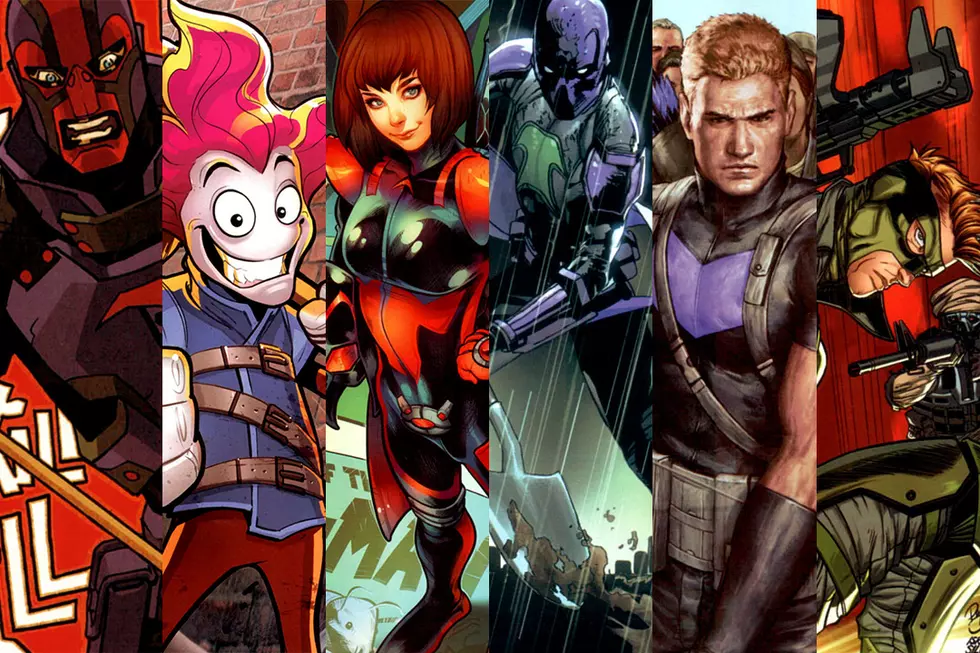![‘Polarity’ #1 Balances Humor, Heart And Hyperviolence [Review]](http://townsquare.media/site/622/files/2013/03/polarity11.jpg?w=980&q=75)
‘Polarity’ #1 Balances Humor, Heart And Hyperviolence [Review]

I admit it. I was worried about Polarity. I'm a 27 year-old dude who, until a few years ago, dreamed of glibly belting thinly-veiled Kamandi allusions over metalcore breakdowns for a living. I'm only filling you in here so you have a sense of the kind of baggage that got unpacked when I was presented with a comic written by the frontman of bands like Say Anything that I once wanted to open for. Max Bemis is somebody who means something to me, but he also still lives in a world I thought I had left behind (or, perhaps, had left me behind) as I focused my attention and career outside of music. So it's funny, or maybe just... y'know... awesome, that Bemis (himself bipolar) and artist Jorge Coelho's comic about a bipolar artist-turned-superpowered man on action hit me like a kind of therapy session. Polarity #1 is a solid deconstruction of youth culture with heart, humor and hints of potent hyperviolence. In other words, it strikes my kind of balance.
Polarity's protagonist is Tim, a budding fine artist who discovers he's bipolar after being struck by a car during a manic, pantsless, public episode (a fictionalized version of something Bemis himself experienced in his youth). The incident colors the way people see him within the hipster bubble of Brooklyn, giving him an ironic amount of credibility with the art crowd and getting him laid. Trouble is, Tim's been working to manage his condition through therapy and other lifestyle changes, leaving him feeling exhausted and uninspired amid a culture he resents relying upon for validation. His curse is his gift is his curse.

Tim's also kind of an ass. He doesn't like himself, so he reduces those around him to concepts, and even objects, to keep his ego above water. This leaves him especially vulnerable when it's suggested that maybe he's just as phony as everyone else. Maybe he was a better artist when he was out of control? Maybe he could ditch the girl he's with for the one he wants if he stopped stifling himself with medication and cut loose again?
 In a desperate attempt to kickstart his life, Tim falls off the wagon and surrenders not only to his old ways, but those of the peers he's been sneering at. He's back in a bad way, alienating himself from his friends and just maybe discovering some new foes.
In a desperate attempt to kickstart his life, Tim falls off the wagon and surrenders not only to his old ways, but those of the peers he's been sneering at. He's back in a bad way, alienating himself from his friends and just maybe discovering some new foes.
Bemis is careful not to present Tim as some kind of lovable loser. You empathize with his discomfort, but you stop seeing him as a Holden Caulfield hopeless romantic and it's made plain he's at least partially a willing participant in his problems ... until he's not.
Therein lies the first issue's big reveal and potential power fantasy appeal. It turns out not everything Tim had been experiencing off of his meds was off-base. Or is it?
If you dig books like Luther Strode, you'll be right at home by the final page of Polarity. On the flipside, those left cold by near-constant comic book brutality aren't necessarily being set up for three pending issues of pain. The first issue's buildup indicates nuance is going to be the order of the day in this series. That's what I'm hoping for anyway, especially when its story is made doubly (or even...triply? quadruply?) interesting by its art team. I want to keep looking at this stuff.
The book's narrative hooks and honesty are made razor sharp by Coelho's interiors. Frazier Irving's vivid covers (and alternates by W. Scott Forbes, Sherri DuPree Bemis, and Tradd Moore and Rico Renzi) will attract your attention, but it's Coelho and colorist Felipe Sobreiro's heavy lifting on every page that really sells Tim's unraveling Bohemia.
 A parody of contemporary culture's gotta, y'know, actually look contemporary, and it's clear the art team took pains to deck out its cast in attire you'd see at any indie rock show, dive bar or art gallery in America (or really, the world) these days. The effort shouldn't be lost on readers all too used to seeing dudes drawn in painted-on t-shirts and jeans, and ladies livin' it up in fashions fresh out of a Limp Bizkit retrospective. You'll either see these characters downtown this weekend... or maybe kind BE these characters this weekend. I ain't judging!
A parody of contemporary culture's gotta, y'know, actually look contemporary, and it's clear the art team took pains to deck out its cast in attire you'd see at any indie rock show, dive bar or art gallery in America (or really, the world) these days. The effort shouldn't be lost on readers all too used to seeing dudes drawn in painted-on t-shirts and jeans, and ladies livin' it up in fashions fresh out of a Limp Bizkit retrospective. You'll either see these characters downtown this weekend... or maybe kind BE these characters this weekend. I ain't judging!
Three more issues remain to see if Bemis and Coelho will stick their landing, but their harmony thus far hints at a satisfying four-issue outing from the team. I shouldn't have been sweating things, especially when I already considered Bemis a successful storyteller in song. Polarity is funny without being snobby, self-deprecating without being whiny and promises big action that won't make you roll your eyes. Bemis makes sure that, whether readers ever heard of him or his music or not, they'll be feel in on his jokes and compelled to stick around for his perhaps more poignant (if superpowered) insights into living with bipolar disorder. I'm into it.
[Click Cover To Enlarge]
More From ComicsAlliance


![‘Rocket Raccoon’ Is Grounded On Earth In New Series By Rosenberg & Coelho [Preview]](http://townsquare.media/site/622/files/2016/12/Rocket-Featured.png?w=980&q=75)
![The Doctor Is Insane In Bemis And Talajic’s ‘Foolkiller’ #1 [Preview]](http://townsquare.media/site/622/files/2016/10/Foolkiller-Featured.jpg?w=980&q=75)

![‘Worst X-Man Ever’ Offers a Tragicomic Take on the X-Men [Review]](http://townsquare.media/site/622/files/2016/01/worstxman.png?w=980&q=75)
![The Good Times Return to Xavier’s School in ‘Worst X-Man Ever’ [Preview]](http://townsquare.media/site/622/files/2015/12/worstxman.png?w=980&q=75)



